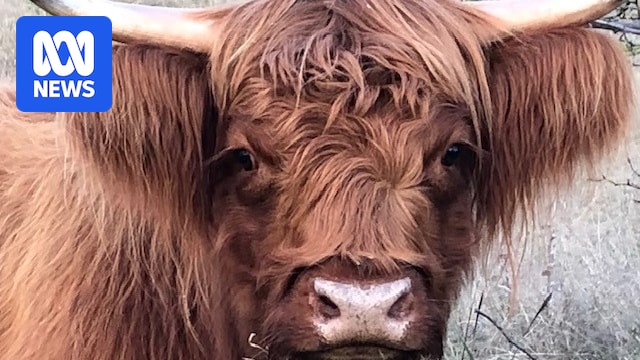Scammers are stealing thousands of dollars by posing as miniature Highland cow breeders and mimicking the websites of real, established businesses.
Anne Waithman and her husband Graeme Wilkinson have been breeding miniature Highland cows for the past seven years.
Ms Waithman was “naturally drawn to these very cute, fluffy animals” and she is not alone.
The breed’s popularity means a single animal can fetch a price of $3,300 or more, making the market a fertile place for scammers.
Anne Waithman and her husband Graeme Wilkinson have had their miniature Highland cow business imitated by scammers. (Supplied: Anne Waithman)
“We have had people duplicating [our] website. Literally page by page, photo by photo,” Ms Waithman said.
“We’ve been contacted by people who thought they’d been dealing with us and paid money to the duplicate site.
“It doesn’t matter what I say, they think I’ve taken their money.”
The gallery pages of the original Miniature Highlands Australia webpage (left) and the imitator scam webpage (right). (ABC News)
Ms Waithman said she had been dealing with imitation websites for more than three years, while trying to warn people about the scammers.
“Initially, we used to say [to buyers] ask for their PIC number, their Property Information Code, but these people had a PIC number,” she said.
“They know the right lingo, they don’t use ranch anymore … the American terminology.”
“Over time they’ve learnt what the Australian buyer is looking for.”
Less experienced farmers more vulnerable
Jhordii McDonnell and her family are new to farm life, having recently bought a 2 hectare property.
Having introduced a variety of animals, they had been considering adding cows too.
Jhordii McDonnell was excited to bring a miniature cow to her family’s new farm before being scammed. (Supplied: Jhordii McDonnell)
“We had quite a few friends tag us in the Facebook page. We decided to look on their website and there they all were,” Ms McDonnell said.
What Ms McDonnell did not realise was she had clicked through to the scam webpage imitating Ms Waithman’s website.
“I contacted the seller via WhatsApp. [We] messaged back and forth of all details of price, availability, what would be good for our hobby farm,” she said.
“I paid the full amount, which included the cow and the transport fee, which was $2,200.
“Come Tuesday, the morning of when the cow was supposed to be delivered, I went to message them again and that was when I had been blocked.”
Images of Anne Waithman’s miniature Highland cows, like Una, Clancy, and Fergus, were copied by scammers impersonating breeders. (Supplied: Anne Waithman)
Ms McDonnell said she “had done the homework” by checking the transport company, the seller’s Australian Business Number, mobile number and bank account, and all seemed legitimate.
She is now awaiting further investigation by the federal police.
The Australian Competition and Consumer Commission deputy chair Catriona Lowe said there were steps people could take to protect against impersonation scams.
“Unfortunately, it can be relatively quick, cheap and easy to set up [fake] websites,” Ms Lowe said.
“Consider engaging a monitoring and removal service … that will effectively scan websites, search for impersonations, and can initiate removal requests.”
Ms Lowe also suggested sharing warnings on social media and business websites.
A scam alert banner on the original Miniature Highlands Australia webpage warns customers not to give payment details without first speaking to the owners. (Supplied: Anne Waithman)
“The steps that we’ve outlined … work for individual pages, but it can mean they come back with subtle variations,” she said.
“This is part of the importance of the incoming Scams Prevention Framework Bill.”
New law places more responsibility on businesses
Passed in February, the Scams Prevention Framework (SPF) Bill sets out obligations that larger companies in designated sectors like telecommunications, banking and digital platforms will be required to follow, such as detecting, reporting and preventing scams.
This is expected to give a new legal right for consumers to seek compensation in court where businesses have not met their SPF obligations, and businesses could face fines of up to $50 million.
A representative from the Treasury office said it was still working on the codes and had not yet reached a public consultation phase.
For now, Ms Lowe said online shoppers should always be cautious and reach out for help if they suspect a scam.
“Scammers are sophisticated criminals. They use psychology, and they use technology to make their scam convincing,” she said.
“Do act quickly if something feels wrong. Reporting suspicious websites to Scam Watch allows us to take action.
“We know that people can feel embarrassed by being victim to a scam, but the reality is it can happen to anybody, and you’re not alone.”

